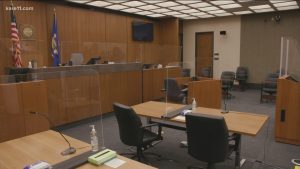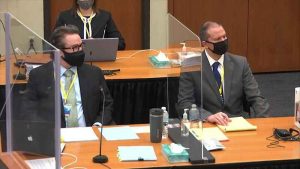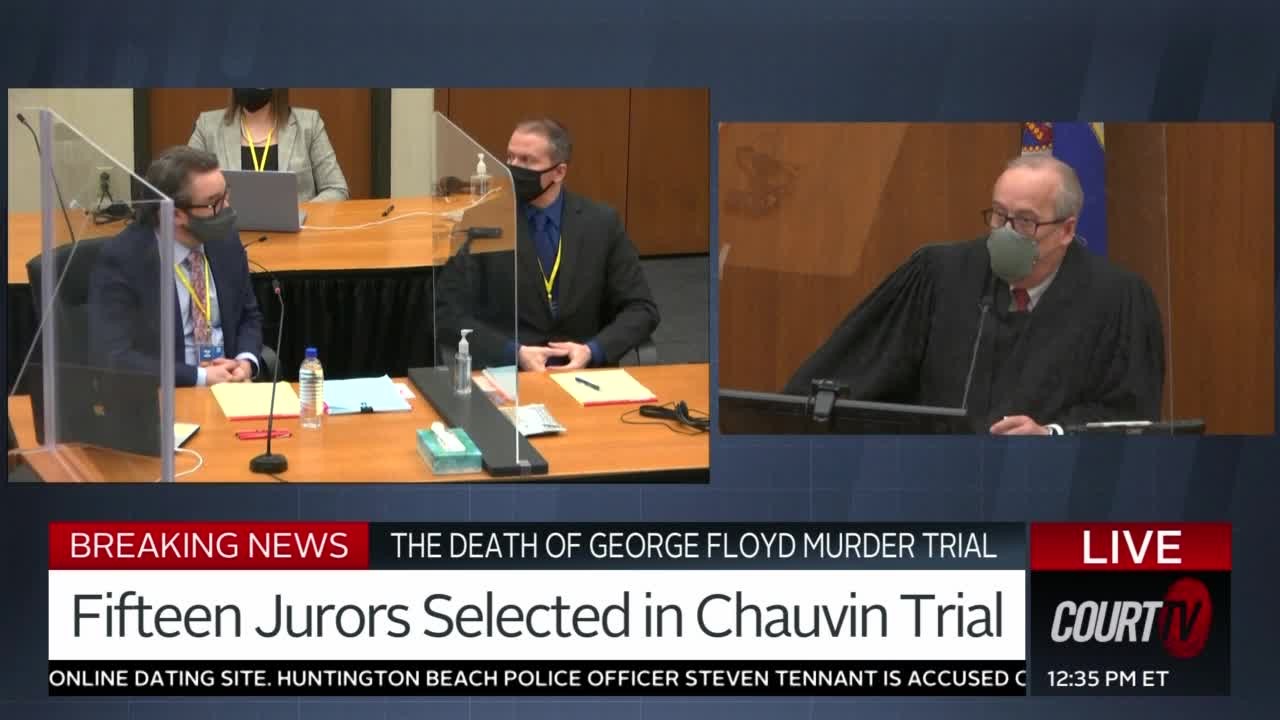The fifteenth and final juror was selected on Tuesday in the murder trial of ex-Minneapolis police officer Derek Chauvin. Proceedings are now on recess until Monday’s opening statements.
District Judge Peter Cahill brought in twelve jury candidates for questioning on Tuesday and clarified that the fifteenth and last seated juror will be excused next Monday. He said he wants to have fifteen in case one should drop out before the trial starts for reasons such as illness, a family emergency, or further exposure to information on Floyd's death that would taint their decision. Fourteen jurors, two of them alternates, will hear the case.
The newest juror selected late Tuesday morning is a married white male accountant in his 20s, who said he thinks analytically due to his occupation and could assess evidence fairly. He said he had first developed a somewhat negative opinion of Chauvin, thinking the length of his restraint on Floyd was longer than necessary. Still, he confirmed he would be able to put that aside and weigh the case based on the evidence. He also pointed out that when Floyd’s death sparked discussions about racism at work, he decided to build his knowledge by reading up on the topic. He conveyed respect for police and views Black Lives Matter somewhat favorably. Though, he also expressed concern that frustrations had gone too far and may have been a factor in Minneapolis’ recent violent unrest.
 Kennepin County Court Room
Kennepin County Court Room
Juror fifteen also said that professional athletes who kneel during the national anthem are trying to start a dialogue on race, but “I would prefer if someone would express their beliefs in a different manner. I think it's more of a respect of those that have come before us and the system that we have in the United States." Concerning the Blue Lives Matter campaign on behalf of the police, he wrote in his juror questionnaire that it "has not done enough to enhance the conversation about other issues such as gun control."
Only one juror—a woman in her 20s—had been selected Monday out of eight questioned. She is a newlywed and a social worker from Wright County and treats people suffering from mental health issues. She expressed confidence that she would judge only the evidence presented in the trial and added that her profession has provided her with the ability to be empathetic and keep an open mind about people. "I'm always thinking about the person and where he came from," she said about Chauvin. "Was it his training?" As for Floyd, she said, "I'm always looking at why someone has done something a certain way. I had all kinds of thoughts of him, his past with drugs, and things like that. I had every emotion." When the woman said "hearing both sides would definitely help" her be fair and impartial to Chauvin, the defense attorney reminded her that his client does not need to present his side during the trial. The woman responded that "Mr. Chauvin's side is his presumption of innocence. That is what I meant by that." She also said she has talked with her friends about police reform and that she thinks “there are things that should be changed.” Though she acknowledged that police are important, and on these topics, she looks at “every side.”
 Derek Chauvin and his Attorney Eric Nelson, listen to potential jurors.
Derek Chauvin and his Attorney Eric Nelson, listen to potential jurors.
Chauvin’s lawyer, Eric Nelson, had used one of his discretionary strikes earlier in the day to eliminate a potential juror described as a white female nursing assistant. The woman said she would be able to judge the case only on the evidence presented, saying, "I can look at it from both sides; look at the facts and go from there." She did, however, reveal that she marched in a protest about a week after Floyd's death with a sign. As well as admitting on the juror questionnaire about Floyd that: "It was not his time to die, and the incident should not have gone as far as it did."
The prosecution used one of their strikes, too, dismissing a candidate who described himself as a competitive fishing enthusiast. The white male said he had not seen much of the news coverage about Floyd's death or the civil unrest that followed and did not remember seeing the arrest video. The man who services and repairs gas pumps for a living said he would be a fair-minded juror and had described his view of Chauvin as "neutral" on his jury questionnaire. He seemed to have stronger opinions about Black Lives Matter, though, stating, "I do not think the riots helped." When asked whether he still associates the riots with the movement, he said, "I would have to say I possibly do."
Several other potential jurors were dismissed on Monday. One woman was excused because she has to care for a seriously ill child at home. Another was concerned her English was not good enough, especially her ability to understand some technical terms. One man said in his questionnaire that he believed this was a case of excessive force, that the force caused Floyd's death, and that police departments and other organizations work to cover up crimes. That man continued to say he could be neutral, despite his strong views. Chauvin's attorney, Nelson, tried to have him dismissed for cause, but Judge Cahill, while pointing out that the potential juror was “evasive” and “flippant,” refused, so Nelson used another peremptory strike to send that man home. Another man was dismissed for cause after he said he was leaning toward finding Chauvin guilty. This man compared the events surrounding Floyd's death to a tussle with a brother, saying: “You wrestle, tussle or whatever, but there's a line of where you have to stop when someone says no more,” he said. In response, Judge Cahill said, "as the little brother to three older brothers, I know exactly what you are talking about," in an affable easy manner which has become the Judges’ custom in these proceedings.
In total, there are four black, two multiracial, and nine white people among the fifteen jurors selected. Nine of the jurors are women, and six are men.
The twelve deliberating jurors will be sequestered during the trial, and their identities kept secret. Should any circumstances arise, which would disrupt the ability of those selected to serve, Judge Cahill closed Tuesday's proceedings by affirming that he will not release the larger jury pool from which the jurors were chosen from the oath they took until Monday's resumption of proceedings.
 Judge Announces Jury has been set/Photo credit: CourtTV
Judge Announces Jury has been set/Photo credit: CourtTV
He also confirmed that he had not changed his opinion on his Friday ruling to reject defense motions to have the trial delayed or moved in the wake of the $27 million civil suit settlement between the city and Floyd’s family, which the defense had argued would taint the jury pool. Judge Cahill wants a fair trial in which the integrity of the legal system is maintained.


